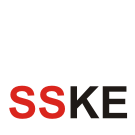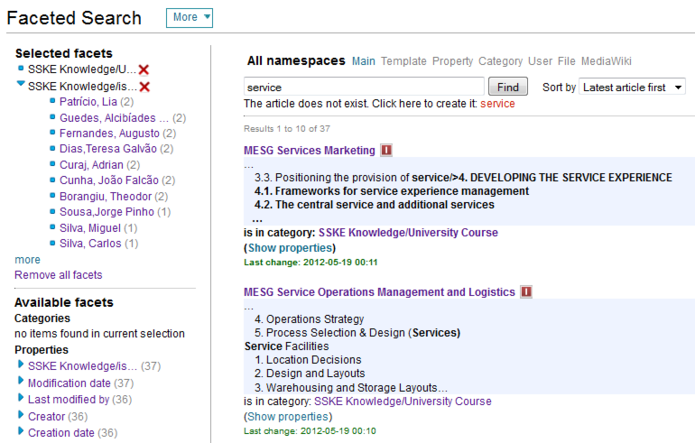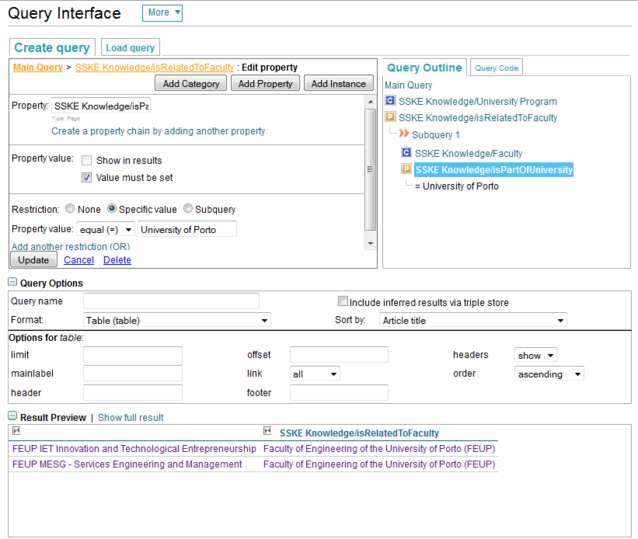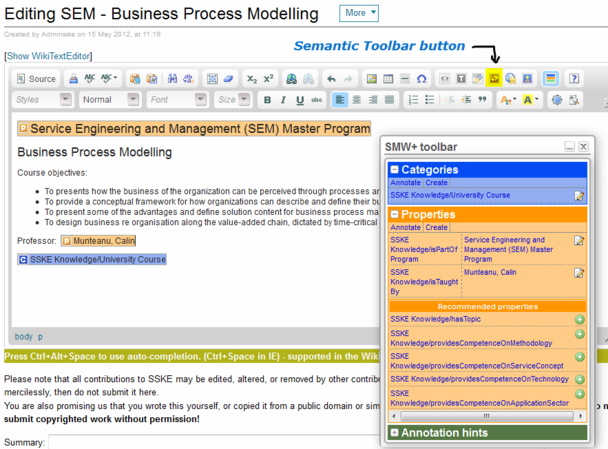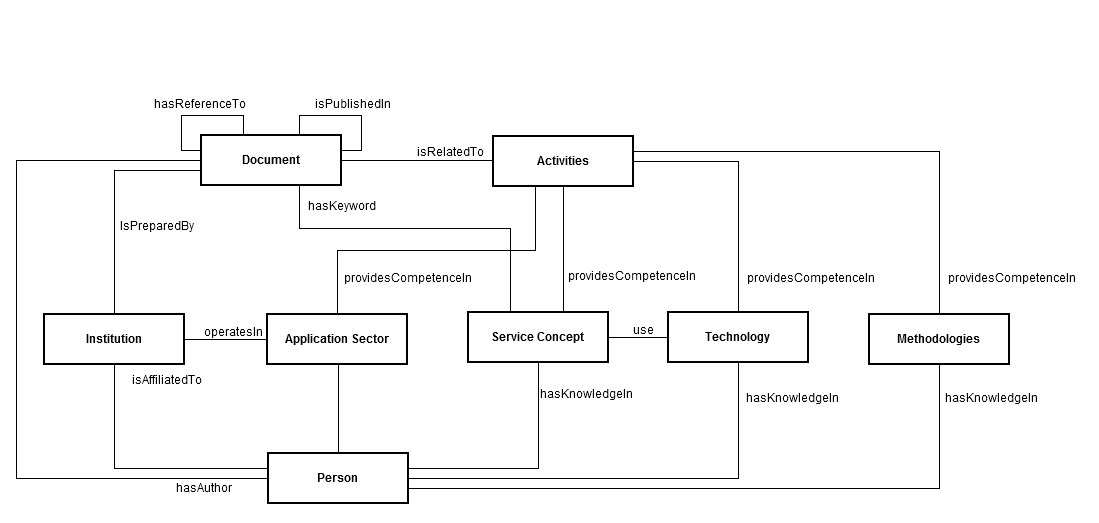From SSKE
| (2 intermediate revisions by one user not shown) | |||
| Line 5: | Line 5: | ||
There are multiple ways in which you can look up for content on this wiki. An important aspect that you should hold in mind is that the wiki content is semantically annotated, which means that meaning of the page content is held as part of a larger structure (the ontology) that contains the concepts related to knowledge sharing in the field of Service Science and the relations between them. Thus, a wiki page may belong to one (or more) category and may relate to other pages through various relations. Pages can also have assigned attributes that show relevant information about the content in a structured way. Attributes and relations are called properties and, along with categories, allow for intelligent retrieval of information. | There are multiple ways in which you can look up for content on this wiki. An important aspect that you should hold in mind is that the wiki content is semantically annotated, which means that meaning of the page content is held as part of a larger structure (the ontology) that contains the concepts related to knowledge sharing in the field of Service Science and the relations between them. Thus, a wiki page may belong to one (or more) category and may relate to other pages through various relations. Pages can also have assigned attributes that show relevant information about the content in a structured way. Attributes and relations are called properties and, along with categories, allow for intelligent retrieval of information. | ||
| − | + | The main entry point for your search is the [http://sske.cloud.upb.ro/wiki/Special%3ASearch Faceted Search], which you can access from the Quicklinks section, or by directly typing your keywords in the search box found in the upper right corner of the page and pressing the Search button. The Faceted Search grants you the possibility of further filtering the results of the search based on categories or properties to which the page can relate by choosing these facets from the lefthand side. | |
| + | |||
| + | [[File:FacetedSearch.PNG|frame|center|687x443px]] | ||
Another way of retrieving content is through the [[Special:QueryInterface|Query Interface]]. This interface allows you to define and build your own query based on categories and properties from the ontology, along with having the retrieved information displayed in various forms such as tabular, alphabetized view, CSV export. The result of the query can also be displayed as part of a wiki article, when the Query Interface is accessed through the Rich Text Editor from the purple question mark button (when the article is opened in edit mode). | Another way of retrieving content is through the [[Special:QueryInterface|Query Interface]]. This interface allows you to define and build your own query based on categories and properties from the ontology, along with having the retrieved information displayed in various forms such as tabular, alphabetized view, CSV export. The result of the query can also be displayed as part of a wiki article, when the Query Interface is accessed through the Rich Text Editor from the purple question mark button (when the article is opened in edit mode). | ||
| + | |||
| + | [[File:QueryInterface.PNG|frame|center|650x539px]] | ||
Latest revision as of 11:35, 12 June 2012
If you are new to SSKE, this section will give you an overview on the main functions that this platform offers and how to use them.
Searching for content
There are multiple ways in which you can look up for content on this wiki. An important aspect that you should hold in mind is that the wiki content is semantically annotated, which means that meaning of the page content is held as part of a larger structure (the ontology) that contains the concepts related to knowledge sharing in the field of Service Science and the relations between them. Thus, a wiki page may belong to one (or more) category and may relate to other pages through various relations. Pages can also have assigned attributes that show relevant information about the content in a structured way. Attributes and relations are called properties and, along with categories, allow for intelligent retrieval of information.
The main entry point for your search is the Faceted Search, which you can access from the Quicklinks section, or by directly typing your keywords in the search box found in the upper right corner of the page and pressing the Search button. The Faceted Search grants you the possibility of further filtering the results of the search based on categories or properties to which the page can relate by choosing these facets from the lefthand side.
Another way of retrieving content is through the Query Interface. This interface allows you to define and build your own query based on categories and properties from the ontology, along with having the retrieved information displayed in various forms such as tabular, alphabetized view, CSV export. The result of the query can also be displayed as part of a wiki article, when the Query Interface is accessed through the Rich Text Editor from the purple question mark button (when the article is opened in edit mode).
Wiki editors can also edit and annotate the content with semantic annotations are means of holding pages meaning in metadata that allows for intelligent retrieval of the wiki's content through queries. The resulted group of metadata is an ontology that holds the strcture of the concepts related to knowledge sharing in the field of Service Science and the relations between them.
Semantic annotation is done by annotating categories and properties on different words, expressions or phrases of the wiki article when opened in edit mode with the Rich Text Editor. There is a special tool which you can use in this extent, called the SMW+ toolbar or Semantic Toolbar. You can select text in the article and annotate a property to it, thus keeping information about relevant meaning of the article or establishing a relation with another article; or you can annotate a category that is representative for the entire article.
Main Ontology
The knowledge environment is organized into different interrelated categories. Here is an overview of the category structure:



